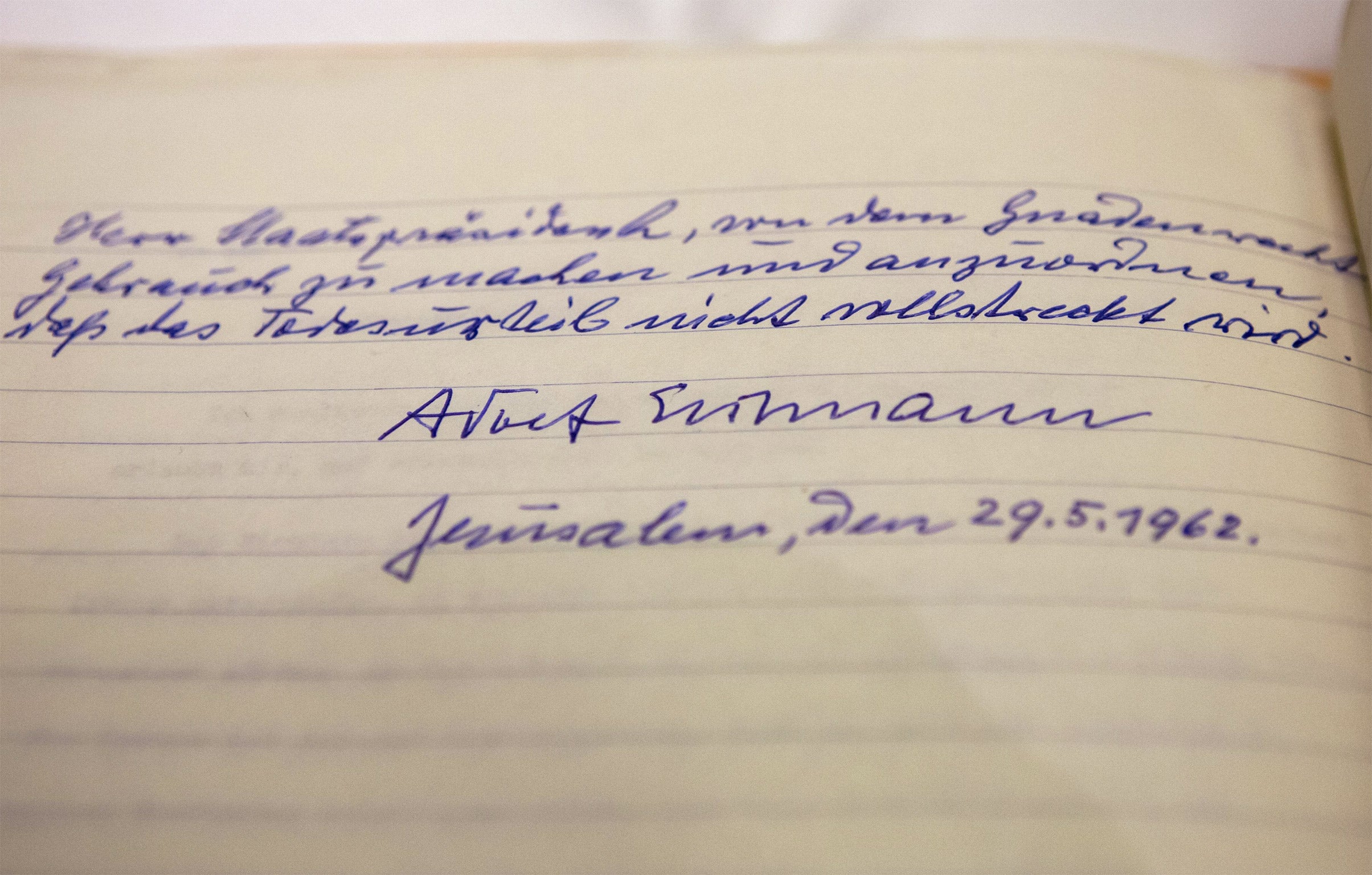Adolf Eichmann: Letter to Israeli president shows Nazi war criminal pleaded for his life before execution
The handwritten note to Yitshak Ben-Zvi was released to coincide with International Holocaust Remembrance Day

Your support helps us to tell the story
From reproductive rights to climate change to Big Tech, The Independent is on the ground when the story is developing. Whether it's investigating the financials of Elon Musk's pro-Trump PAC or producing our latest documentary, 'The A Word', which shines a light on the American women fighting for reproductive rights, we know how important it is to parse out the facts from the messaging.
At such a critical moment in US history, we need reporters on the ground. Your donation allows us to keep sending journalists to speak to both sides of the story.
The Independent is trusted by Americans across the entire political spectrum. And unlike many other quality news outlets, we choose not to lock Americans out of our reporting and analysis with paywalls. We believe quality journalism should be available to everyone, paid for by those who can afford it.
Your support makes all the difference.The Nazi war criminal Adolf Eichmann pleaded for his life in a letter to the Israeli President two days before his execution, newly released documents show. He wrote that he had been “forced” to serve as an instrument of more powerful leaders whom, he said, bore the real responsibility for the Holocaust.
The handwritten letter in German to President Yitshak Ben-Zvi, dated 29 May 1962, was released to coincide with International Holocaust Remembrance Day and the 55th anniversary of the trial in Jerusalem.
Eichmann oversaw the concentration of millions of Eastern European Jews into ghettoes and their transport together with that of Jews from other parts of Europe to the death camps. Yet, in his letter, as in his trial, he insisted he bore no responsibility. “I detest as the greatest of crimes the horrors which were perpetrated against the Jews and think it right that the initiators... will stand trial,” he wrote.
“Notwithstanding, there is a need to draw a line between the leaders responsible and the people like me forced to serve as mere instruments in the hands of the leaders. I was not a responsible leader and as such do not feel myself guilty,” he added. Eichmann had been abducted by Israeli intelligence agents from Argentina in 1960, where he was living as a fugitive under an alias.
In his letter asking for clemency, among a number of other original documents released from the trial, Eichmann maintained that he was not of high enough rank to be considered “a persecutor in the pursuit of Jews” and that it was wrong to view him as “the driving, zealous force” in this respect. Had he been so, he argued, he would have been promoted and received other awards.
He even claimed that he had put in for a transfer from his job after he witnessed the “horror” being perpetrated.
“It is also incorrect that I was never influenced by human emotions. Specifically under the impression of the unspeakable horrors that I witnessed, I immediately requested a transfer to a different post,” he wrote. Eichmann added that he should be given credit for “revealing of my own will during the police investigation horrors which had been until then unknown in order to help establish the indisputable truth”.
Eichmann’s five siblings, Emil Eichmann, Irmgard Molnar, Otto Eichmann, Frederick Eichmann and Robert Eichmann also penned an appeal to President Ben-Zvi. ‘’Being acquainted with our brother’s nature, his education and the position of our family, we can say with conviction that the impulses of our brother do not conflict with the ethical principles of social order,” they wrote. “It is only out of an obligation to his oath as an officer that he felt obliged to follow the rule and regulations set out by the country’s leadership at the time, that forced him into a situation that was impossible to face.’’
Israel’s President, Reuven Rivlin, presented the batch of documents during an event at his official residence that was attended by Holocaust survivors and people who played a role in the Eichmann case. “Not a moment of kindness was given to those who suffered Eichmann’s evil,” Mr Rivlin said in a statement. “Eichmann’s application for amnesty revealed here today proves that Eichmann and his family recognised that in the state of Israel, a murderer such as Eichmann would be convicted and that justice would be done.”
Eichmann was hanged on 31 May 1962 and then cremated. He remains the only person judicially executed by the Jewish state.
Join our commenting forum
Join thought-provoking conversations, follow other Independent readers and see their replies
Comments